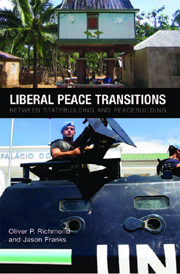Book contents
- Frontmatter
- Contents
- Acknowledgements
- List of Acronyms
- Introduction: a Framework to Assess Liberal Peace Transitions
- 1 Cambodia: Liberal Hubris and Virtual Peace
- 2 Bosnia: Between Partition and Pluralism
- 3 Liberal Peace in East Timor: the Emperors' New Clothes?
- 4 Co-opting the Liberal Peace: Untying the Gordian Knot in Kosovo
- 5 Building/Rejecting the Liberal Peace: State Consolidation and Liberal Failure in the Middle East
- Conclusion: Evaluating the Achievements of the Liberal Peace and Revitalising a Virtual Peace
- Select Bibliography
- Index
5 - Building/Rejecting the Liberal Peace: State Consolidation and Liberal Failure in the Middle East
Published online by Cambridge University Press: 12 September 2012
- Frontmatter
- Contents
- Acknowledgements
- List of Acronyms
- Introduction: a Framework to Assess Liberal Peace Transitions
- 1 Cambodia: Liberal Hubris and Virtual Peace
- 2 Bosnia: Between Partition and Pluralism
- 3 Liberal Peace in East Timor: the Emperors' New Clothes?
- 4 Co-opting the Liberal Peace: Untying the Gordian Knot in Kosovo
- 5 Building/Rejecting the Liberal Peace: State Consolidation and Liberal Failure in the Middle East
- Conclusion: Evaluating the Achievements of the Liberal Peace and Revitalising a Virtual Peace
- Select Bibliography
- Index
Summary
Introduction
It is widely assumed that ‘peace’ is ambiguous in nature in the Middle East, and indeed it cannot be thought of as any more than a negative peace. This is part of a general exceptionalism that is directed towards some polities around the world in the broader milieu of the conditionalities of global governance. Thus, peace in the Middle East need not be liberal, though there has been movement in this direction. Exceptionalism remains but liberal conditionalities are making their mark in a somewhat less obvious manner than in other conflict regions. Though some in the academic community in Israel are generally critical of securitised strategies and policies, which they believe to be counter-productive, ‘peace’ has been seen by the conservative and military elites of the region as something which potentially undermines long-held political beliefs and interests. The state framework in the region tends to represent peace as highly militarised and centralised, discriminatory, and privileging certain groups and their internal solidarity. This has led to internal ambivalences within these states as to their own use of violence and coercion of the ‘others’ it identifies, resulting in broader nationalist, linguistic, ethnic, cultural and religious cleavages. These provide the basis for the organisation of politics and result in securitisation rather than an emancipatory or even orthodox form of the liberal peace. The response to this – the mechanisms of peace through liberal governance and its institutions – have appeared in a limited fashion, with little success.
- Type
- Chapter
- Information
- Liberal Peace TransitionsBetween Statebuilding and Peacebuilding, pp. 149 - 180Publisher: Edinburgh University PressPrint publication year: 2009

